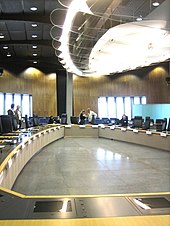Powers and functions

The Commission was set up from the start to act as an independent supranational authority separate from governments; it has been described as "the only body paid to think European". The members are proposed by their member state governments, one from each. However, they are bound to act independently – free from other influences such as those governments which appointed them. This is in contrast to the Council of the European Union, which represents governments, the European Parliament, which represents citizens, the Economic and Social Committee, which represents organised civil society, and the Committee of the Regions, which represents local and regional authorities.
Through Article 17 of the Treaty on European Union the Commission has several responsibilities: to develop medium-term strategies; to draft legislation and arbitrate in the legislative process; to represent the EU in trade negotiations; to make rules and regulations, for example in competition policy; to draw up the budget of the European Union; and to scrutinise the implementation of the treaties and legislation. The rules of procedure of the European Commission set out the Commission's operation and organisation.
Executive poweredit
Before the Treaty of Lisbon came into force, the executive power of the EU was held by the Council: it conferred on the Commission such powers for it to exercise. However, the Council was allowed to withdraw these powers, exercise them directly, or impose conditions on their use. This aspect has been changed by the Treaty of Lisbon, after which the Commission exercises its powers just by virtue of the treaties. Powers are more restricted than most national executives, in part due to the Commission's lack of power over areas like foreign policy – that power is held by the European Council, which some analysts have described as another executive.
Considering that under the Treaty of Lisbon, the European Council has become a formal institution with the power of appointing the Commission, it could be said that the two bodies hold the executive power of the EU (the European Council also holds individual national executive powers). However, it is the Commission that currently holds executive powers over the European Union. The governmental powers of the Commission have been such that some, including former Belgian Prime Minister Guy Verhofstadt, have suggested changing its name to the "European Government", calling the present name of the Commission "ridiculous".
Legislative initiativeedit
The Commission differs from the other institutions in that it alone has legislative initiative in the EU. Only the Commission can make formal proposals for legislation: they cannot originate in the legislative branches. Under the Treaty of Lisbon, no legislative act is allowed in the field of the Common Foreign and Security Policy. In the other fields, the Council and Parliament are able to request legislation; in most cases the Commission initiates on the basis of these proposals. This monopoly is designed to ensure coordinated and coherent drafting of EU law. This monopoly has been challenged by some who claim the Parliament should also have the right, with most national parliaments holding the right in some respects. However, the Council and Parliament may request the Commission to draft legislation, though the Commission does have the power to refuse to do so as it did in 2008 over transnational collective conventions. Under the Lisbon Treaty, EU citizens are also able to request the Commission to legislate in an area via a petition carrying one million signatures, but this is not binding.
The Commission's powers in proposing law have usually centred on economic regulation. It has put forward a large number of regulations based on a "precautionary principle". This means that pre-emptive regulation takes place if there is a credible hazard to the environment or human health: for example on tackling climate change and restricting genetically modified organisms. The European Commission has committed EU member states to carbon neutrality by 2050. This is opposed to weighting regulations for their effect on the economy. Thus, the Commission often proposes stricter legislation than other countries. Owing to the size of the European market, this has made EU legislation an important influence in the global market.
Recently the Commission has moved into creating European criminal law. In 2006, a toxic waste spill off the coast of Côte d'Ivoire, from a European ship, prompted the Commission to look into legislation against toxic waste. Some EU states at that time did not even have a crime against shipping toxic waste; this led the Commissioners Franco Frattini and Stavros Dimas to put forward the idea of "ecological crimes". Their right to propose criminal law was challenged in the European Court of Justice but upheld. As of 2007, the only other criminal law proposals which have been brought forward are on the intellectual property rights directive, and on an amendment to the 2002 counter-terrorism framework decision, outlawing terrorism‑related incitement, recruitment (especially via the internet) and training.
Enforcementedit
Once legislation is passed by the Council and Parliament, it is the Commission's responsibility to ensure it is implemented. It does this through the member states or through its agencies. In adopting the necessary technical measures, the Commission is assisted by committees made up of representatives of member states and of the public and private lobbies (a process known in jargon as "comitology"). Furthermore, the Commission is responsible for the implementation of the EU budget, ensuring, along with the Court of Auditors, that EU funds are correctly spent.
In particular the Commission has a duty to ensure the treaties and law are upheld, potentially by taking member states or other institutions to the Court of Justice in a dispute. In this role it is known informally as the "guardian of the treaties". Finally, the Commission provides some external representation for the Union, alongside the member states and the Common Foreign and Security Policy, representing the Union in bodies such as the World Trade Organization. It is also usual for the President to attend meetings of the G8.
Comments
Post a Comment